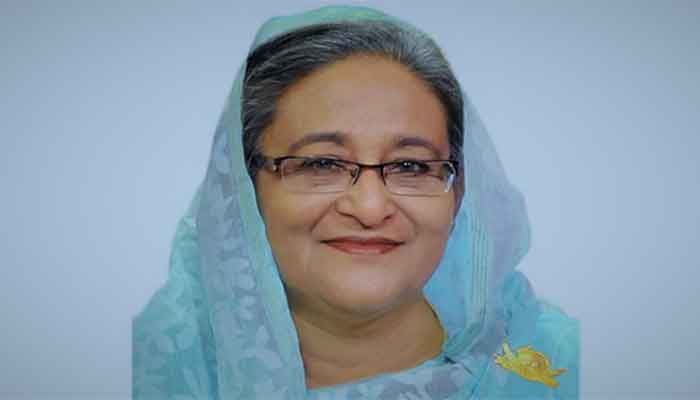
Desk Report
Publish: 29 Sep 2020, 10:35 am

Prime Minister Sheikh Hasina said that climate change, pandemics and the destruction of nature are common challenges and should unite all in working towards a common solution-a cleaner, greener and safer world.
"As we say in Bangla, 'Bhabia korio kaj, koria bhabio na' (think before you act, not after you're done), we shouldn't do something that can't be reversed," she said in her recent article in the Financial Times, one of the world's most respected newspapers with editorial offices based in London, although it was bought by Japan's Nikkei Inc. in 2015, reports UNB.
In Bangladesh, water is a matter of life and death.
"My country is a land of great rivers, large coastlines and resilient people, but 2020 has been a challenge for us like no other," said the Prime Minister, noting that in May, Cyclone Amphan left a trail of destruction in the south-western parts of the country, and then monsoon rains over one-third of the country, leaving thousands of people homeless and destroying vast areas of cropland.
When water is blowing through someone's home, damaging his or her belongings, leaving pollution and disease in its way, it's hard, wrote the Prime Minister.
"It is twice as difficult in the year that Covid-19 reached, making it difficult to access clean water essential for sanitation and pandemic prevention," reads the paper.
She wrote, "As I write in Dhaka, the waters of the Brahmaputra and Padma basins are receding. My people are getting their lives back, albeit under the shadow of coronavirus."
In its post, the Prime Minister told global readers that they were evaluating flood defenses and providing relief to those affected. "As always, plans are being drawn up to ensure that we are better prepared in the future, because there's always a next time in Bangladesh. The climate crisis doesn't sleep."
It warns the countries that believe they are safe from the climate crisis, the bankers and financiers that believe they can stop it. "You can't. Covid-19 has shown that no nation or company can survive on its own. Only together can we solve global crises. It has also shown that prevention is simpler than cure.
The Prime Minister stated that they are facing a global emergency, a triple crisis of environment , health and nature. "The loss of biodiversity is intensified and exacerbated by climate change."
Bangladesh isn't alone in experiencing the wrath of god.
This year, fires raged in the Amazon, Australia, California and Siberia. Cyclones and hurricanes have hit the US, the Caribbean and most of Asia. The United Kingdom, host of the COP26 climate summit next year, has been hit by floods.
Climate change stems from the lack of sustainability of human activities, reads the article. "We are experiencing floods, rainfalls, cyclones, heatwaves, landslides and droughts in recent years with more fury and intensity, which also endangers food security. We need to recognise their gravity."
A metre rise in sea level will inundate numerous small island and coastal nations, she mentioned.
Floods from melting glaciers will bring devastation to mountain countries, reads the article that millions of people will become climate refugees. "The world has no capacity to shelter such numbers."
The G20 countries are responsible for about 80 per cent of pollution, while the bottom 100 countries account for just 3.5 per cent, writes the Prime Minister.
The emitters have greater accountability and must make greater contributions by means of the mitigation required to limit the global temperature increase to 1.5C.
"Bangladesh, as the new President of the Climate Vulnerable Forum, is seeking more support from the international community and the G20 for increased funding and technology access to speed adaptation for those countries most at risk," reads the report.
In that group, Bangladesh is one of the best prepared for extreme weather.
"We are building sea walls, planting mangrove forests, embedding resilience in all governmental work."
"But we can not go on this path alone. Sixty-four countries and the EU signed this week's Pledge for Nature to respond to the planetary emergency. They represent about 1.4 billion people and one-quarter of the world's gross domestic product. From there, we need to create a collective political will both domestically and internationally."
As hosts of the next COP, G7 and G20 meetings, the UK and Italy must drive this agenda, which requires a comprehensive support package for hardest hit nations.
Business leaders, CEOs, CFOs and investors at all levels have a role to play.
"You may believe your bottom line is quarterly results. But our common bottom line is far more important: if nature is degraded to the extent it cannot protect us, we will all suffer. What happens in Bangladesh affects stocks in London and New York," the Prime Minister writes.
She said that no one is immune to rising sea levels and the only solution is a structural change in government policy and business practice, from high to low carbon, from exploitation of the earth to care.
A recent review by Vivid Economics of the answer to Covid-19 shows that its effect on climate change has been mixed. "I salute the EU for prioritizing a green recovery."
"We are preparing to do the same in Bangladesh, and I fervently hope that my fellow government leaders and business leaders will do the same. Jobs must be a priority, but so are potential jobs and the building of sound foundations for decades to come," reads the article.
Subscribe Shampratik Deshkal Youtube Channel
© 2024 Shampratik Deshkal All Rights Reserved. Design & Developed By Root Soft Bangladesh